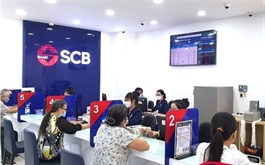Lack of transparency holds back insurance
Lack of transparency holds back insurance
Sales of newly issued investment-linked insurance policies have plummeted considerably, reflecting broader challenges in the sector and highlighting the need for increased transparency in insurance products.

According to data revealed last week from the Insurance Supervisory Authority under the Ministry of Finance (MoF), sales of newly issued investment-linked insurance policies have plunged over 40 per cent, significantly impacting the insurance sector’s performance in the first four months of the year.
The total revenue from new insurance premiums in the life insurance market fell nearly 32 per cent on-year to approximately $291.6 million.
Specifically, Bao Viet Life Insurance led the market in new premium revenue with nearly 18 per cent market share, followed by Dai-ichi (15 per cent), Prudential (15 per cent), and Manulife (10 per cent).
Investment-linked insurance continues to hold the largest share, contributing nearly 70 per cent of new premium revenue in the life insurance sector. However, sales of this product category fell sharply by 42 per cent on-year to around $200 million. In terms of the number of contracts, this product accounted for more than half of the new contracts sold in the past four months.
Investment-linked insurance had previously experienced rapid growth due to the profitable investment effect in a low-interest-rate environment, coupled with the expansion of bank distribution channels. However, last year’s major industry crisis has made this product increasingly difficult to sell.
An industry leader noted, “Essentially, this product offers optimal cash flow for insurance participants. However, widespread, non-transparent selling practices and ignoring customers’ risk appetites have turned this once-premium product into a less attractive option for consumers.”
With investment-linked insurance becoming less accessible, companies are shifting their focus to traditional products such as mixed insurance and term insurance. In the first four months of the year, new sales of mixed insurance surged 255 per cent to approximately $23.52 million, and term insurance increased by over 65 per cent to around $18.6 million.
In the same period, agents were paid $19.6 million in commissions, an 8 per cent increase on-year. Of this, commissions for original insurance brokerage reached $15.76 million and for reinsurance brokerage $3.84 million.
According to Nguyen Thi Hong Van, financial consultant at FIDT Investment Consulting and Asset Management, in terms of investment-linked insurance, there are two popular products: universal life insurance and unit-linked insurance.
“Universal life insurance provides policyholders with returns based on the actual annual investment interest of the fund, but guarantees a minimum interest rate corresponding to the minimum account value,” Van said. “Conversely, unit-linked insurance allows customers to choose an investment fund that aligns with their profit expectations and risk tolerance.”
This package does not offer a guaranteed interest rate, Van added. Instead, customers fully benefit from and bear all risks associated with the investment. “Many unit-linked investment funds have achieved average returns of 8-14 per cent per annum over the past decade, comparable to open-end funds,” Van said.
At a National Assembly discussion last month, Pham Van Hoa, a deputy from the Mekong Delta province of Dong Thap, expressed support for the stance that banks should not be allowed to engage in the sale of insurance.
“The high commission rates for life insurance agents are the primary reason for the widespread practice of forcing loan customers to purchase life insurance at many commercial banks,” Hoa said. “However, when customers seek to claim their benefits, they face significant obstacles from the insurers. Obtaining insurance payouts has become an arduous task for many, with some individuals even forfeiting their benefits due to the exhausting process.”
In the same discussion, Minister of Finance Ho Duc Phoc noted that several regulations have been introduced to prevent the coercion of insurance purchases through banks and to ensure accurate product advice. For instance, banks acting as insurance agents must clearly inform customers that insurance products are not part of the bank’s financial offerings.
“Banks are banned from advising or selling investment-linked insurance products within 60 days before or after loan disbursement,” Phoc said. “This is designed to prevent bank employees from using approval authority to pressure borrowers into purchasing insurance.”




























